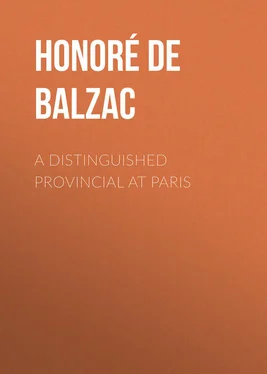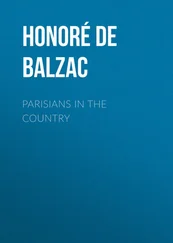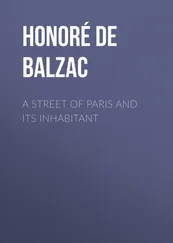Honoré Balzac - A Distinguished Provincial at Paris
Здесь есть возможность читать онлайн «Honoré Balzac - A Distinguished Provincial at Paris» — ознакомительный отрывок электронной книги совершенно бесплатно, а после прочтения отрывка купить полную версию. В некоторых случаях можно слушать аудио, скачать через торрент в формате fb2 и присутствует краткое содержание. Жанр: literature_19, foreign_antique, foreign_prose, на английском языке. Описание произведения, (предисловие) а так же отзывы посетителей доступны на портале библиотеки ЛибКат.
- Название:A Distinguished Provincial at Paris
- Автор:
- Жанр:
- Год:неизвестен
- ISBN:нет данных
- Рейтинг книги:4 / 5. Голосов: 1
-
Избранное:Добавить в избранное
- Отзывы:
-
Ваша оценка:
- 80
- 1
- 2
- 3
- 4
- 5
A Distinguished Provincial at Paris: краткое содержание, описание и аннотация
Предлагаем к чтению аннотацию, описание, краткое содержание или предисловие (зависит от того, что написал сам автор книги «A Distinguished Provincial at Paris»). Если вы не нашли необходимую информацию о книге — напишите в комментариях, мы постараемся отыскать её.
A Distinguished Provincial at Paris — читать онлайн ознакомительный отрывок
Ниже представлен текст книги, разбитый по страницам. Система сохранения места последней прочитанной страницы, позволяет с удобством читать онлайн бесплатно книгу «A Distinguished Provincial at Paris», без необходимости каждый раз заново искать на чём Вы остановились. Поставьте закладку, и сможете в любой момент перейти на страницу, на которой закончили чтение.
Интервал:
Закладка:
INDUCTIONS MORALES, by Keratry.
“They are lucky, that they are!” exclaimed Lucien.
The placard, a new and original idea of the celebrated Ladvocat, was just beginning to blossom out upon the walls. In no long space Paris was to wear motley, thanks to the exertions of his imitators, and the Treasury was to discover a new source of revenue.
Anxiety sent the blood surging to Lucien’s heart, as he who had been so great at Angouleme, so insignificant of late in Paris, slipped past the other houses, summoned up all his courage, and at last entered the shop thronged with assistants, customers, and booksellers – “And authors too, perhaps!” thought Lucien.
“I want to speak with M. Vidal or M. Porchon,” he said, addressing a shopman. He had read the names on the sign-board – VIDAL & PORCHON (it ran), French and foreign booksellers’ agents .
“Both gentlemen are engaged,” said the man.
“I will wait.”
Left to himself, the poet scrutinized the packages, and amused himself for a couple of hours by scanning the titles of books, looking into them, and reading a page or two here and there. At last, as he stood leaning against a window, he heard voices, and suspecting that the green curtains hid either Vidal or Porchon, he listened to the conversation.
“Will you take five hundred copies of me? If you will, I will let you have them at five francs, and give fourteen to the dozen.”
“What does that bring them in at?”
“Sixteen sous less.”
“Four francs four sous?” said Vidal or Porchon, whichever it was.
“Yes,” said the vendor.
“Credit your account?” inquired the purchaser.
“Old humbug! you would settle with me in eighteen months’ time, with bills at a twelvemonth.”
“No. Settled at once,” returned Vidal or Porchon.
“Bills at nine months?” asked the publisher or author, who evidently was selling his book.
“No, my dear fellow, twelve months,” returned one of the firm of booksellers’ agents.
There was a pause.
“You are simply cutting my throat!” said the visitor.
“But in a year’s time shall we have placed a hundred copies of Leonide ?” said the other voice. “If books went off as fast as the publishers would like, we should be millionaires, my good sir; but they don’t, they go as the public pleases. There is some one now bringing out an edition of Scott’s novels at eighteen sous per volume, three livres twelve sous per copy, and you want me to give you more for your stale remainders? No. If you mean me to push this novel of yours, you must make it worth my while. – Vidal!”
A stout man, with a pen behind his ear, came down from his desk.
“How many copies of Ducange did you place last journey?” asked Porchon of his partner.
“Two hundred of Le Petit Vieillard de Calais , but to sell them I was obliged to cry down two books which pay in less commission, and uncommonly fine ‘nightingales’ they are now.”
(A “nightingale,” as Lucien afterwards learned, is a bookseller’s name for books that linger on hand, perched out of sight in the loneliest nooks in the shop.)
“And besides,” added Vidal, “Picard is bringing out some novels, as you know. We have been promised twenty per cent on the published price to make the thing a success.”
“Very well, at twelve months,” the publisher answered in a piteous voice, thunderstruck by Vidal’s confidential remark.
“Is it an offer?” Porchon inquired curtly.
“Yes.” The stranger went out. After he had gone, Lucien heard Porchon say to Vidal:
“We have three hundred copies on order now. We will keep him waiting for his settlement, sell the Leonides for five francs net, settlement in six months, and – ”
“And that will be fifteen hundred francs into our pockets,” said Vidal.
“Oh, I saw quite well that he was in a fix. He is giving Ducange four thousand francs for two thousand copies.”
Lucien cut Vidal short by appearing in the entrance of the den.
“I have the honor of wishing you a good day, gentlemen,” he said, addressing both partners. The booksellers nodded slightly.
“I have a French historical romance after the style of Scott. It is called The Archer of Charles IX. ; I propose to offer it to you – ”
Porchon glanced at Lucien with lustreless eyes, and laid his pen down on the desk. Vidal stared rudely at the author.
“We are not publishing booksellers, sir; we are booksellers’ agents,” he said. “When we bring out a book ourselves, we only deal in well-known names; and we only take serious literature besides – history and epitomes.”
“But my book is very serious. It is an attempt to set the struggle between Catholics and Calvinists in its true light; the Catholics were supporters of absolute monarchy, and the Protestants for a republic.”
“M. Vidal!” shouted an assistant. Vidal fled.
“I don’t say, sir, that your book is not a masterpiece,” replied Porchon, with scanty civility, “but we only deal in books that are ready printed. Go and see somebody that buys manuscripts. There is old Doguereau in the Rue du Coq, near the Louvre, he is in the romance line. If you had only spoken sooner, you might have seen Pollet, a competitor of Doguereau and of the publisher in the Wooden Galleries.”
“I have a volume of poetry – ”
“M. Porchon!” somebody shouted.
“ Poetry !” Porchon exclaimed angrily. “For what do you take me?” he added, laughing in Lucien’s face. And he dived into the regions of the back shop.
Lucien went back across the Pont Neuf absorbed in reflection. From all that he understood of this mercantile dialect, it appeared that books, like cotton nightcaps, were to be regarded as articles of merchandise to be sold dear and bought cheap.
“I have made a mistake,” said Lucien to himself; but, all the same, this rough-and-ready practical aspect of literature made an impression upon him.
In the Rue du Coq he stopped in front of a modest-looking shop, which he had passed before. He saw the inscription DOGUEREAU, BOOKSELLER, painted above it in yellow letters on a green ground, and remembered that he had seen the name at the foot of the title-page of several novels at Blosse’s reading-room. In he went, not without the inward trepidation which a man of any imagination feels at the prospect of a battle. Inside the shop he discovered an odd-looking old man, one of the queer characters of the trade in the days of the Empire.
Doguereau wore a black coat with vast square skirts, when fashion required swallow-tail coats. His waistcoat was of some cheap material, a checked pattern of many colors; a steel chain, with a copper key attached to it, hung from his fob and dangled down over a roomy pair of black nether garments. The booksellers’ watch must have been the size of an onion. Iron-gray ribbed stockings, and shoes with silver buckles completed is costume. The old man’s head was bare, and ornamented with a fringe of grizzled locks, quite poetically scanty. “Old Doguereau,” as Porchon styled him, was dressed half like a professor of belles-lettres as to his trousers and shoes, half like a tradesman with respect to the variegated waistcoat, the stockings, and the watch; and the same odd mixture appeared in the man himself. He united the magisterial, dogmatic air, and the hollow countenance of the professor of rhetoric with the sharp eyes, suspicious mouth, and vague uneasiness of the bookseller.
“M. Doguereau?” asked Lucien.
“That is my name, sir.”
“You are very young,” remarked the bookseller.
“My age, sir, has nothing to do with the matter.”
“True,” and the old bookseller took up the manuscript. “Ah, begad! The Archer of Charles IX. , a good title. Let us see now, young man, just tell me your subject in a word or two.”
Читать дальшеИнтервал:
Закладка:
Похожие книги на «A Distinguished Provincial at Paris»
Представляем Вашему вниманию похожие книги на «A Distinguished Provincial at Paris» списком для выбора. Мы отобрали схожую по названию и смыслу литературу в надежде предоставить читателям больше вариантов отыскать новые, интересные, ещё непрочитанные произведения.
Обсуждение, отзывы о книге «A Distinguished Provincial at Paris» и просто собственные мнения читателей. Оставьте ваши комментарии, напишите, что Вы думаете о произведении, его смысле или главных героях. Укажите что конкретно понравилось, а что нет, и почему Вы так считаете.












